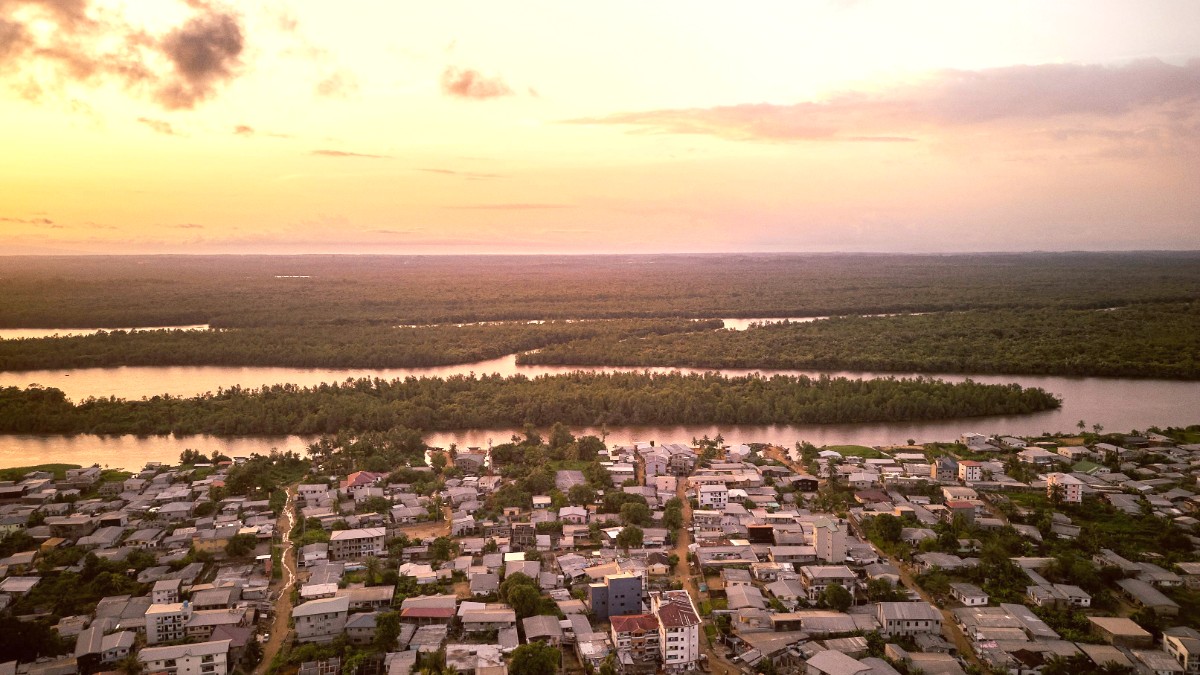
Cameroon
Staple ingredients include plantains, yams, cassava, rice, maize, groundnuts, and various leafy greens.
The blend of influences creates an unique and hearty dining experience.
Rich, savory, often spicy, with a strong umami from smoked fish or groundnuts.
Douala incorporates dishes from all over Cameroon. Its coastal location means seafood is specifically prominent.
Dishes often feature fresh fish from the Wouri River or the Atlantic.
Cameroon’s national dish. A rich, savory stew made from bitterleaf (or spinach), groundnuts, crayfish, and often beef, fish, or shrimp.
Serve it with plantains, cocoyams, or rice. Find it widely available in local restaurants ("maquis") and some hotels.
A spicy, rich dish from the South West region, popular in Douala. Made from wild spinach, waterleaf, and palm oil, often cooked with beef, fish, and cow skin.
Serve with garri (cassava flour).
Fresh fish (often tilapia or sole) marinated in spices and grilled.
Serve it with fried or roasted plantain, miondo (fermented cassava stick), or white rice, and a spicy sauce. Find it everywhere, especially at roadside grills and specialized restaurants.
Palm Wine: Fermented sap from palm trees, milky white, mildly alcoholic. Bil-Bil: A traditional millet beer. Local Beers: Castel, 33 Export, Beaufort are widely available lagers. Soft Drinks: Locally produced sodas. Fresh Juices: Pineapple, mango, papaya (seasonal).
Beignets: Fried dough (similar to donuts), often eaten for breakfast. Groundnuts: Roasted or boiled. Fresh Tropical Fruits: Mango, pineapple, papaya, banana, avocado (seasonal).
Douala a few upscale restaurants, often within luxury hotels or in areas like Bonapriso. They international cuisine (French, Lebanese, Italian) and some refined Cameroonian dishes. Reservations may be required.
Local, informal eateries ("maquis") serve traditional Cameroonian dishes at affordable prices. Street food stalls on almost every street corner offer snacks. Markets like Marché Central or Sandaga offer fresh and affordable meals.
Douala’s expat community and international business presence mean you can find restaurants offering French, Italian, Lebanese, Indian, and Chinese cuisine, notably in Bonapriso and parts of Akwa/Bonanjo.
Numerous options a mix of Cameroonian, African, and some international dishes.
Good for a sit-down meal in a comfortable setting. Places in Akwa and Bali.
Marché Central (Central Market): A bustling market where you find fresh produce, meat, fish, and various street food vendors.
Marché Sandaga: Another large, lively market with food sections.
Light, often bread with omelette, tea, or coffee.
Main meal of the day, typically substantial, eaten between 12:00 PM and 2:00 PM.
Lighter than lunch, eaten later in the evening, from 7:00 PM onwards.
Specific dishes prepared for holidays like Christmas or Eid, but no prominent unique festival foods exclusive to Douala.
Many staple foods (plantains, yams, cassava, rice) are naturally gluten-free. Cross-contamination poses a risk in local kitchens. Clearly explain your needs.
Cross-contamination is a risk in local kitchens.
Communicating severe allergies (e.g., nuts, seafood) challenging due to language barriers and limited awareness.
Carry a Translation card for critical allergies.
Eating at a local maquis a quintessential Douala experience, authentic and lively dining.
Dining at a simple roadside stall specializing in freshly grilled fish a must-do.
Visit Marché Central or Sandaga for fresh produce and diverse street food.
Formal cooking classes not widely advertised for tourists.
Some local tour operators arrange private cooking demonstrations if requested.
Specific food festivals not a major tourist attraction in Douala.
Local events feature food, but these not always widely publicized to international visitors.
Traditional cuisine is meat-heavy, but vegetarian options available. Vegan challenging.
Halal available. Kosher extremely difficult to find.
Communication challenging. Carry translation card for critical allergies.
Embrace the local dining scene, which often features fresh and flavorful ingredients.